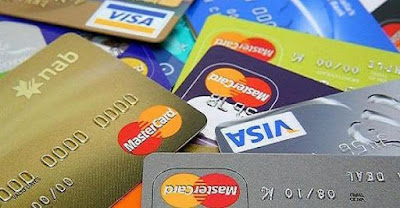Cash vs debit card: Which is safer to use?
 Whenever you go on shopping sprees, do you always carry so much cash to
pay for the stuffs that you buy in the markets? Well, if that is your choice,
so be it.
Whenever you go on shopping sprees, do you always carry so much cash to
pay for the stuffs that you buy in the markets? Well, if that is your choice,
so be it.
To most shoppers, this kind of practice is nothing new anymore. And it
shouldn’t even raise your eyebrows whenever you see some people take out wads of
money to pay for the goods that they buy.
They always believe that it doesn't only free them up with the worries
of paying for the increasing interests
that their monthly bills could pile up. This, too, means to say that they'll
have less to worry about because once they have paid those purchases with cash,
they’re done.
Mind you, there are people who don't feel secured having wads of cash in
their pockets for personal reasons. Instead, some of them prefer to use "plastic money" to buy things that they need.
While cash payments are good, using your debit card for your purchases
is a much safer alternative. Aside from the convenience that it may give you,
sometimes you can also reap hefty reward points from all purchases that you
make, especially if the bank wanted to attract new customers in a particular
branch.
Unlike the credit cards, which can easily be used by anybody, the debit
cards have built-in security features which protect card holders from scammers
and hackers alike. Although there are instances when card holders are
victimized by fraud probably because of their carelessness, the use of a debit card is something that every account
holder should take into consideration.
In lieu of taking the time to withdraw cash from your deposit account,
using the debit card is another best alternative for someone who is busy or in
a hurry. From the stand point of a careful card holder, maximizing the use of
the debit card seems to be a good idea and a portable way to buy things handy.
But what exactly is a debit card and what are its advantages?
The U.K.-based Money Advice Service has described a debit card as the
first payment choice for people who don't like to pay on credit. It adds that
any debit card holder can withdraw money from cash machines, and pay for
purchases either online or by phone.
"When you pay with a debit card, the money comes directly out of
your account. It’s basically the same as withdrawing cash on the spot and
handing it over – but safer because there’s a bit of fraud protection and the
card is easy to cancel if it’s lost or stolen," MAS said.
Like the credit card, you an swipe it, punch some buttons and put it
back in your wallet. How tough can it be? Actually, experts say there are a
handful of ways you can modify your debit card usage to make sure you're not
wasting any of your hard-earned money on unnecessary fees or having your
valuable dollars locked up by some companies.
According to Dana McDonald of StockMonkeys.com, a financial and investment
site: “You don't create debt using debit cards and that's always smart if you
have the money in your account. “
McDonald noted that banks are looking to boost profits by reducing the
risks of using debit cards and offering new perks for consumers who are willing
to switch, such as rewards programs. “And it's working. Debit cards today
account for about half of all card transactions.”
However, you also need to keep
track of your card, she warned. “If your card gets stolen, a thief can empty
your bank account in minutes. Thieves don't even need your card, as long as
they have your name and card number.”
Meanwhile, Linda Sherry, director
of national priorities for watchdog group Consumer Action, shared some of her
views to CreditCards.com.
She encouraged cardholders not to opt for overdraft protection,
“especially if you know deep in your heart (be honest!) that you can sometimes
be a little careless when it comes to money management. It can only take a few
errant swipes to rack up some big fees.”
Sherry said that cardholders should be aware of what the banks are
sending them. “Even though some banks are starting to cap the number of
overdraft charges they'll zing you with over the course of a day or a week,
it's still money coming out of your pocket,” she adds.
“A better solution is to link the
checking account connected to that debit card with a savings account or line of
credit,” she explained.
Or, better still, write down your transactions in a check register or go
online to check your account information, Sherry said.


Comments